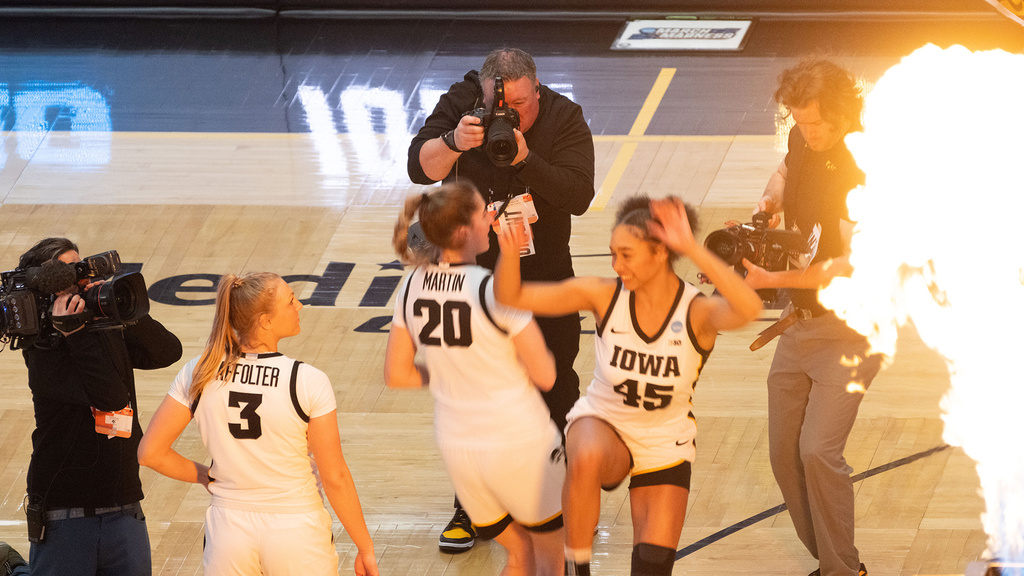The answer depends on what you're looking for in a degree program and in a career.
Earning a journalism or communication degree is a significant investment of time and money, so it’s only natural that you would want to go to the best journalism school possible — whether in person or online.
But what is best for you may not be the best for someone else. Learn the differences between different online journalism degrees and decide which one is best for you.
Can I earn a journalism degree online?
Yes, you can earn an associate, a bachelor’s, a master’s, or a doctorate degree in journalism online.
Online learning had been growing steadily for a couple decades due to its increased accessibility, flexibility, and convenience, but it really surged during the COVID-19 pandemic.
In fact, 53% of college and university students enrolled in at least one online class in 2023. When it comes to master’s and doctoral students, that number was 54%, with 39% exclusively taking online courses.
53 %
enrolled in at least one online class in 2023
- Online only: 26%
- Hybrid: 27%
- In-person only: 47%
Source: National Center for Education Statistics
What college has the best online journalism program?
Nearly 1,400 colleges and universities in the United States offer some type of journalism degree, with many schools featuring an online learning component of some kind. But which school is the best?
Well, it depends on how you define “best.” Each student’s priorities are different.
There are dozens of journalism school rankings available — including “best online journalism program” — from a range of sources, each with its own ranking methodology.
One tool you can use to help narrow down your search is the list of colleges and universities that are accredited by the Accrediting Council on Education in Journalism and Mass Communications (ACEJMC). The ACEJMC does not rank programs. Instead, it evaluates journalism programs based on its established educational requirements and standards.
It’s important to note that not every program that indicates it has a distance education program is fully online. It’s possible that it is, but it’s also possible that it is a hybrid model, offering some classes online but requiring in-person attendance for others. Some schools also only offer online master's degrees and not undergraduate degrees.
You also should know that the ACEJMC is voluntary, and not every school chooses to seek it. Some very fine journalism programs are not listed here. So, if a school you’re interested in is not on it, that doesn’t necessarily mean there is something wrong with it.
Still, this list can be a great starting point to help you determine which online journalism program is best for you.
Bachelor’s degree programs in journalism and related fields at ACEJMC-accredited universities with some type of online component
| Institution name | State | Number of online programs |
|---|---|---|
| Arizona State University Digital Immersion | AZ | 2 |
| Arkansas State University | AR | 1 |
| Ball State University | IN | 4 |
| Colorado State University–Fort Collins | CO | 1 |
| Drake University | IA | 1 |
| Eastern Illinois University | IL | 1 |
| Florida International University | FL | 1 |
| Kansas State University | KS | 2 |
| Louisiana State University and Agricultural and Mechanical College | LA | 1 |
| Loyola University New Orleans | LA | 3 |
| Murray State University | KY | 3 |
| Saint Cloud State University | MN | 1 |
| The University of Alabama | AL | 2 |
| University of Arizona | AZ | 2 |
| University of Florida | FL | 4 |
| University of Florida–Online | FL | 3 |
| University of Idaho | ID | 1 |
| University of Memphis | TN | 2 |
| University of Minnesota–Twin Cities | MN | 2 |
| West Virginia University | WV | 1 |
(Source: Accrediting Council on Education in Journalism and Mass Communications)
Master’s degree programs in journalism and related fields at ACEJMC-accredited universities with some type of online component
| Institution name | State abbreviation (HD2022) | Number of online master's programs |
|---|---|---|
| American University | DC | 1 |
| Arizona State University Digital Immersion | AZ | 3 |
| Arkansas State University | AR | 3 |
| Ball State University | IN | 3 |
| Baylor University | TX | 1 |
| Colorado State University–Fort Collins | CO | 1 |
| Drake University | IA | 1 |
| Florida International University | FL | 1 |
| Kansas State University | KS | 1 |
| Kent State University at Kent | OH | 1 |
| Loyola University New Orleans | LA | 1 |
| Michigan State University | MI | 1 |
| Murray State University | KY | 2 |
| New York University | NY | 2 |
| Ohio University–Main Campus | OH | 1 |
| Shippensburg University of Pennsylvania | PA | 1 |
| South Dakota State University | SD | 1 |
| St Bonaventure University | NY | 1 |
| Syracuse University | NY | 1 |
| Temple University | PA | 2 |
| The University of Alabama | AL | 2 |
| The University of Tennessee–Knoxville | TN | 1 |
| University of Arizona | AZ | 2 |
| University of Florida | FL | 1 |
| University of Georgia | GA | 2 |
| University of Illinois Urbana–Champaign | IL | 1 |
| University of Iowa | IA | 1 |
| University of Kansas | KS | 2 |
| University of Memphis | TN | 1 |
| University of Minnesota–Twin Cities | MN | 1 |
| University of Mississippi | MS | 1 |
| University of Nebraska–Lincoln | NE | 1 |
| University of North Carolina at Chapel Hill | NC | 1 |
| University of North Texas | TX | 1 |
| University of Oklahoma–Norman Campus | OK | 1 |
| University of South Florida | FL | 1 |
| University of Southern California | CA | 1 |
| University of Southern Mississippi | MS | 1 |
| West Virginia University | WV | 2 |
(Source: Accrediting Council on Education in Journalism and Mass Communications)
5 steps to choosing an online journalism program
Once you’ve decided that you want to get your journalism or communication degree online, you’ll go through many of the same steps to choose a college or university as if you were planning to go in person.
While you may not need to consider how much you like the campus, there are a few other things you should do.
Here are five:
1. Decide what type of online program you want.
Earning a degree online can look different from program to program. For example, they can be:
- 100% online, in which you likely will have no physical interaction with your professors or other students.
- Hybrid, which combines some online classes with some in-person components — whether that is classes, labs, or experiential learning opportunities.
- Largely in-person with some online components.
You’ll also need to decide if you want one of two types of online learning:
- Synchronous learning: This is when professors and students gather at the same time (whether in a virtual or physical space) and interact in real time. Students are required to log in and participate at specific times and days. They also can get immediate feedback and ask questions in the moment.
- Asynchronous learning: This is when students access materials (recorded lectures or other resources) at their own pace and interact with professors and other students over longer periods of time. This can provide a more flexible schedule, but it can be more difficult to build relationships and can take longer to receive feedback and get answers to questions.
2. Check the accreditation status of the college or university.
An accredited degree program at an accredited school will help ensure that you receive a high-quality education that results in a degree that is respected by future employers.
The U.S. Department of Education keeps an accreditation database that can help you get started. You also can check journalism and communication programs’ accreditation with the Accrediting Council on Education in Journalism and Mass Communications.
A school’s reputation also can be analyzed by how well it’s known at a local or national level, as well as its job placement records, alumni network, and student satisfaction rates.
3. Ask what types of resources and experiential learning opportunities are available.
If you were looking for an in-person education, you would explore the support services and resources available to students. This should be no different for an online education.
- Will you have an advisor to assist you with selecting classes and developing a long-range academic plan?
- Is online tutoring available?
- Will you have access to the same library and research resources as on-campus students?
- What kind of technical support will you have?
Experiential learning is the process of learning by doing, and it’s a critical component to a journalism and communication education. These activities can include internships, practicums, field exercises, study abroad, and undergraduate research.
Ask how they facilitate online students getting such hands-on learning opportunities, especially if the experiences require equipment such as a camera, microphones, specialized software, or access to a multimedia studio.
4. Check out the faculty.
The quality of instructors can make or break your learning experience — whether it’s online or in person. So, you want to find a journalism or communication program that invests in qualified professors.
Check out the credentials of the instructors. Do they have real-world experience in the field? Are they experienced faculty who know how best to share their knowledge with students?
You also want to make sure that the faculty are accessible. Do they have office hours during which they can easily be reached by email, messaging, or telephone?
Along with checking on the quality of instructors, ask about the student-faculty ratio. Because sometimes it doesn’t matter how good the professor is if they have far too many students to realistically give adequate attention to.
5. Look out for potential red flags.
Unfortunately, there are online colleges and universities that prey on students seeking a degree.
Keep an eye out for any of these warning signs:
- Vague or missing information, including about tuition rates, faculty, course requirements, or the length of the program.
- Lack of quality faculty, or classes that rely on course materials instead of an instructor.
- Low graduation rates.
- Excess or upfront fees. It’s normal for schools to charge some fees on top of tuition, but extremely high fees can be a warning sign.
Finally, listen to your gut. If it sounds too good to be true, it probably is.
Are online degrees respected?
The landscape of online education has undergone a remarkable transformation, and perceptions of online degrees have shifted significantly. As companies adapted to remote work and training during the pandemic, employers gained a deeper understanding of online work and learning — and increasingly recognized the value of online credentials.
While some employers may still harbor reservations about online degrees, a Job Outlook 2024 survey conducted by the National Association of Colleges and Employers (NACE) reveals encouraging data, including that 87% of employers hired new college graduates with online degrees. Furthermore, employers reported equivalent pay for new hires with online degrees compared to those with traditional in-person degrees.
87 %
Source: NACE Job Outlook 2024 survey
Related content

Can you earn a journalism degree online?

What jobs can you get with a journalism degree?

